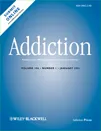| Titre : | Abuse of codeine-containing cough syrups: a report from India (1997) |
| Titre traduit : | (L'abus de sirop pour la toux contenant de la codéine: un rapport de l'Inde) |
| Auteurs : | S. K. MATTOO ; D. BASU ; A. SHARMA ; M. BALAJI ; A. MALHOTRA |
| Type de document : | Article : Périodique |
| Dans : | Addiction (Vol.92, n°12, December 1997) |
| Article en page(s) : | 1783-1787 |
| Note générale : |
Addiction, 1997, 92, (12), 1783-1787
|
| Langues: | Anglais |
| Discipline : | EPI (Epidémiologie / Epidemiology) |
| Mots-clés : |
Thésaurus mots-clés CODEINE ; SOCIOLOGIE ; DEMOGRAPHIE ; CONSOMMATION ; MESUSAGEThésaurus géographique INDE |
| Résumé : |
FRANÇAIS :
L'objectif est d'étudier le profil clinique et socio-démographique des patients demandant un traitement suite à une consommation abusive de sirops pour la toux contenant de la codéine (STC). 46 patients dépendants de STC d'une clinique pour toxicomanes du Nord de l'Inde participent à l'étude. Il ressort que tous les patients sont des hommes dont l'âge moyen est 23 ans. L'initiation s'est faite surtout par des amis, souvent par curiosité et en moins de 6 mois. 89 % ont évolué vers une consommation quotidienne et en quantités plus élevées que celles indiquées dans la notice. La plupart des patients déclarent ressentir un effet stimulant et euphorique avec le STC. Ces effets ainsi que le bas prix, la facilité d'approvisionnement et la préparation "pure" des STC peuvent être responsables de la rapide croissance de popularité de ce produit en tant que drogue d'abus en Inde. ENGLISH: A study on the socio-demographic and clinical profile of patients seeking treatment for abuse of codeine-containing cough syrups (CCS). The study is observing 46 consecutive treatment-seeking patients in an addiction clinic in North India. Many were young (mean age 27 years) with completed school education and from urban backgrouds. The mean age of starting CCS use was 23 years. Initiated commonly through friends and often for curiosity, 89% of the patients progressed to daily use of CCS in less than 6 months and in quantities much higher than prescribed limits . The combination of an opioid and a sympathomimetic agent in the CCS may cause a special distinct euphoric effect. This effect, along with the low price, easy availability and "pure" preparation of CCS may be responsible for the rapidly rising popularity of the CCS as drug abuse in India. (From authors'abstract). |
| Domaine : | Drogues illicites / Illicit drugs |
| Refs biblio. : | 16 |
| Affiliation : |
Dept Psychiat., PGIMER, Chandigarh 160012 Inde. India. |
| Numéro Toxibase : | 204521 |
| Centre Emetteur : | 02 Coordonnateur |
 Accueil
Accueil



